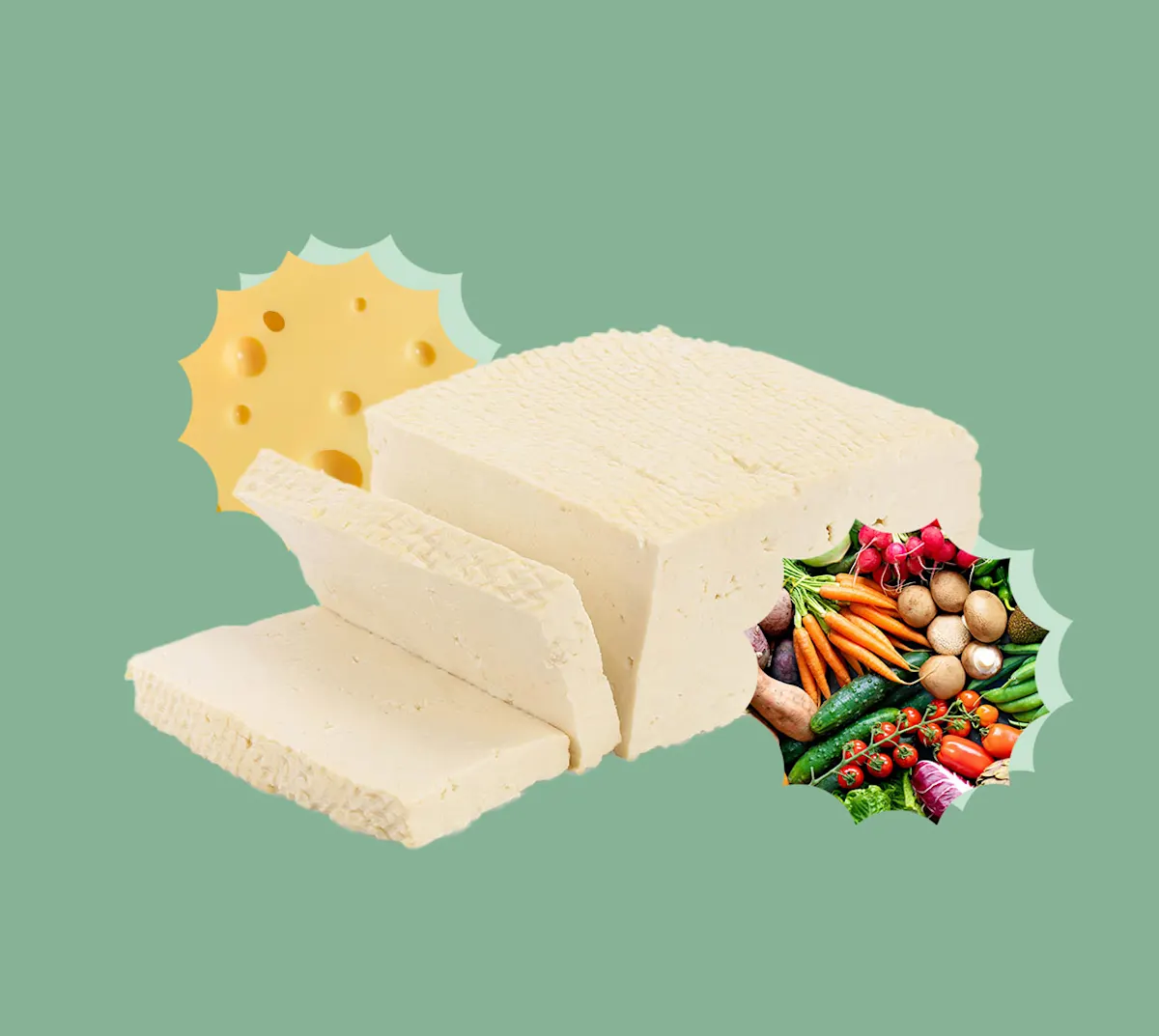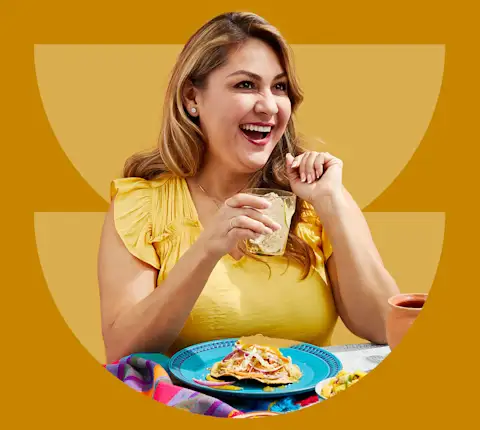“I would rather do without cheese than settle for meh and less-than-meh vegan cheese,” says award-winning vegan food writer and chef Ellen Kanner — and every vegan ever.
Not long ago, this sentiment could mean the difference between choosing veganism over vegetarianism — or forgoing cheese altogether. After all, while the plant-based product boom has been quick to give us delicious alternative milks, meats, ice creams, and even passable egg substitutes, vegan cheese remained about as sexy as carob and wheat germ — until now. With evolved methodologies, ingredients, and more makers than ever, the next generation of alternative cheese is abundant and poised to melt cheese lovers’ hearts everywhere.
Humble Beginnings
Non-dairy cheeses date back to 16th century China, where cheeses were made with fermented tofu. Between then and now there’s been an ongoing stream of fermented soy products and a peanut-based effort in the late 1800s — by cereal magnate Dr. John Harvey Kellogg, no less. More recently, imitation cheeses made from starches, oils, additives, and flavorings have successfully answered the call for gooey nacho cheese and faux mac ‘n’ cheese sauces. But they don’t come close to holding their own on a cheese plate.
How the Wheels Got Turning
There’s good reason for the innovation lag. Dairy cheeses get their bloomy, aromatic, richly flavored and textured character from cheese culturing, a fermentation process that traditionally uses nonvegan strains of lactic acid bacteria as well as casein, a dairy-based protein responsible for helping milk to form a curd.
Making vegan milk can be as easy as soaking and blending nuts or seeds with water and straining. But making vegan starter cultures that create those critical cheese qualities? That’s been a challenge of scientific proportions — at least until the godmother of modern vegan cheese, Miyoko Schinner, stepped on the scene and helped crack the vegan cheese code. She introduced the practice of using rejuvelac — a vegan fermented liquid made from sprouted grain — and traditional cheesemaking techniques to successfully culture plant-based milks into artisan plant-based cheeses. As Kanner explains, she “discovered you could culture plant-based milk like you could dairy milk; I’m sure this was done before but she’s the one that got the world’s attention.” Schinner’s 2012 cookbook, “Artisan Vegan Cheese,” was the nod home inventors needed. But when she launched her vegan dairy product line under the label Miyoko’s Creamery in 2014, she set the gold standard for the masses with rich, perfectly flavored European-style butter and exciting soft cheeses. Just like that, the new age of vegan cheese was born.
Taste the Latest
With a whole new generation of cheesemakers finding culture-starter success with vegan probiotics and enzymes, you can taste the difference. “There are some really amazing brands now. They’re cultured and they have what we like about cheese — the mouthfeel and that kind of umami, funky flavor,” says Kanner.
Michaela Grob, owner of Manhattan vegan cheese shop Riverdel in Essex Market, agrees. “We have quite a lot of brie-style, camembert-style, and blue-cheese style that are vegan and excellent. There are more aged cheeses available now, too.”
Chef Michael Whiteman, of San Francisco’s popular vegan restaurant Wildseed, eats dairy cheese on his own time, but when he began exploring plant-based options for work, he was “definitely pleasantly surprised.” He explains, “I started with the company two years ago and that was my first big exposure to vegan food. The offerings have come a long way both in the variety of product availability and the variety of cheeses themselves.”
Whiteman’s menu regularly features a bounty of plant-based cheeses, many of which are available in stores nationwide. Miyoko’s smoked cashew mozzarella, Violife’s Mozzarella Cheese Shreds, and Violife’s Just Like Parmesan adorn his Green Forest Pizza, a verdant melange of broccolini, mushrooms, arugula, lemon, and chimichurri. Follow Your Heart’s vegan American slices top his Impossible burger, and its deliciously familiar parmesan-style shredded cheese is stirred into his risotto along with Violife’s Just Like Parmesan and Kite Hill’s ricotta.
Unfortunately, many of the small-batch artisan cheeses from boutique producers aren’t as widely distributed due to the financial constraints of mass production, aging, shipping, and distribution. But some can be found on restaurant menus or specialty cheese shops.
For example, if you’re craving a rich, bloomy-buttery blue or camembert-style cheese with an intensely flavored, thick and traditional blue-mold exterior, Brooklyn-based RIND is here for you. A forerunner in just how good vegan cheese can be, the award-winning vegan creamery uses a proprietary blend of vegan cultures to make cheeses that are free of dairy-based milk, cultures, or casein. You can find them at select locations, including the Vremery Vegan Cheese Shop and Melt Bar in Paso Robles, California.
In Austin, Texas, artisan-cheesemaker-meets-vegan-deli Rebel Cheese is another pioneer. The shop introduces diners to its exciting house-made aged and fresh vegan cheeses through cheese plates; classic caprese salads layered with creamy-snappy vegan mozzarella; and hefty vegan bacon and brie sandwiches bulging with creamy aged brie, caramelized onions, arugula, and sweet fig jam. Grob, who carries Rebel Cheese in her Manhattan shop, is a fan. “Their aged cheeses are firmer and the texture is really familiar. Their chevre-style cheeses are also very popular,” she says.
Firmly Set on a Successful Future
Still, don’t rush out to find plant-based aged gruyere just yet. For vegan cheese makers, crafting a hard cheese is still … hard. However, the industry is quickly getting closer. “We have a really, really great parmesan from Italy that’s made from chickpeas,” Grob, whose shop specializes in boutique-brand artisan cheeses, promises. “And I know a company making casein that's vegan and companies looking at lab-grown milk. That’s going to change a lot of things.”
Cheese from chickpeas? Why not!? Right now “cashews are mostly used because they are very fatty and neutral tasting,” Grob says. “They’re great for making any type of cheese without a nut flavor.” But sunflower, hemp, pumpkin seeds, and more are finding their way into sliceable, grateable, loveable non-dairy cheeses.
RIND’s latest innovation shows just how creative one can get with vegan cheese ingredients. Its new release, under its “Veggie Underground” label, is a nut-free, soy-free, gluten-free, dairy-free American-style cheese that looks, feels, and tastes like the creamy vibrant-yellow squares we all know and love. But its primary base ingredient is — get this — carrots. Wholesale distribution is just beginning for this instant award-winner.
Cheese raked in $5.6 billion in U.S. sales in 2022, according to Denise Purcell, vice president of resource development for The Specialty Food Association. Sure, just a tiny slice can be attributed to plant-based cheeses, but Purcell sees that slice becoming more of a wedge. “Cashew-based, minimally processed plant-based, plant-based aged varieties, and vegan ricotta are all among trends we see helping drive the cheese category over the next five years,” she says.
Renowned cheese expert Laura Werlin agrees. Though the vegan cheeses of yesteryear haven’t inspired her to drop her dairy habits, she sees that alternative cheese is ripe for success. She says, “We are a long way from the last chapter being written. I have every reason to think it’s just going to keep getting better.”
Shop Grocery





